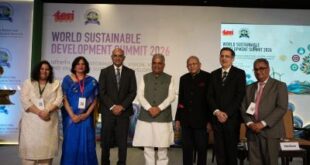Experts raise alarm over late diagnoses, high costs, and limited access to precision therapies at awareness meet hosted by AbbVie India
Mumbai, 27th May 2025 – In a city recognized for its premier cancer treatment centers, Acute Myeloid Leukemia (AML) remains a growing yet under-recognized health emergency. At an awareness discussion hosted by AbbVie India, leading oncologists, from the city spoke the need to examine Mumbai’s AML burden and its impact on healthcare access, survival outcomes, and affordability. For many patients, the onset is silent, the symptoms vague, and the window for intervention tragically narrow. Despite global strides in targeted therapies and diagnostics, India still faces major challenges in awareness, access, and affordability. With cases gradually rising, experts are calling for AML to be recognized as a national health priority to prevent avoidable loss of life.
Though Mumbai houses renowned oncology centers, access to molecular diagnostics and AML-targeted therapies remains limited outside certain hospitals. Many patients delay treatment due to financial constraints or seek care in late stages when treatment is less effective.
Dr. Abhay A. Bhave, MD, FRCPA(Australia) ,Haematologist, Lilavati Hospital and Research Centre in Bandra West, Mumbai said, “Acute myeloid leukaemia (AML), while rare among all haematological malignancies, is the most feared one. It has an excellent chemotherapy combination for control of disease, including deep remission (control, not cure), but is fraught with complications, including life-threatening ones due to severe infections and bone marrow suppression. Literally, we carpet bomb the bone marrow with chemotherapy and hope that the fire settles in time to allow normal blood cells to regrow in the bone marrow! Sometimes this fire is uncontrolled, and we remain helplessly as passive onlookers. Fortunately, with better supportive care and facilities and with earlier diagnosis, we can still win in many of these patients and plan at least a functional cure with treatment followed by bone marrow transplantation.”
He further added, “AML can be a relapsing, relentless disease based on the genes that cause this disease. Fortunately, many new agents are available in the Indian market that allow precision therapy and hence better outcomes. However, this adds to cost and not all patients are able to avail the same. Also Allogeneic bone marrow transplantation (normal HLA-matched stem cells from a relative or unrelated donor given to the patient) is expensive and not easy to obtain.”
“In 60% of the AML cases we see, patients arrive in advanced stages with infection and bleeding which impairs our ability to give full treatment to such patients. However with advent of newer agents which are non chemo therapy we are able to give a chance of treatment to such difficult patient presentations. Better public and physician awareness along with routine molecular screening may help save many lives said, Dr Punit L Jain, MBBS, MD, DM (Clinical Hematology) Fellowship (Leukemia) MD Anderson Cancer Center, USA |,Oncology at Apollo Hospitals, Mumbai
Advances in AML Treatment: A Hopeful Shift
Traditional chemotherapy, the mainstay of AML treatment, has often been poorly tolerated, especially in older patients. However, the emergence of targeted therapies—which act on specific genetic mutations driving the disease—has dramatically improved remission rates, reduced toxicity, and enhanced quality of life for patients globally.
India, however, has yet to fully benefit from these advancements. Access to molecular and genetic testing remains largely confined to private urban centers. Targeted drugs are often unaffordable, as they are not included in public health schemes or the National Cancer Drug Registry.
Policy Imperatives: A Roadmap for Transforming AML Care in India
To address the unmet needs in AML diagnosis and treatment, stakeholders are urging the Indian healthcare system to adopt a multi-pronged strategy:
Recognize AML as a Public Health Priority: Integrate AML into the national cancer control strategy to enable focused funding, epidemiological tracking, and research prioritization.
Expand Access to Diagnostics: Establish infrastructure for molecular and genetic testing at government and tertiary care hospitals. Promote public-private partnerships to train diagnostic personnel and scale up access.
List AML-targeted Therapies in the National Cancer Drug Registry: Ensure regulatory inclusion of new therapies and adopt pricing mechanisms like subsidies or government procurement to reduce costs.
Reform Insurance and Reimbursement: Include AML-targeted therapies in Ayushman Bharat and private insurance schemes to ease out-of-pocket expenditure for patients.
Launch a National Awareness and Screening Program: Drive public education on early AML symptoms through national campaigns and equip general practitioners with tools for early detection.
Integrate AML into National Health Data Systems: Link AML cases to digital health records and cancer registries for real-time tracking and better health planning.
Support Clinical Research and Trials: Provide regulatory and financial incentives for India-focused AML research to enable locally viable treatment protocols and innovations.
As the burden of AML continues to rise, India must act decisively to improve patient outcomes. Strategic policy changes, enhanced awareness, and equitable access to innovation can turn the tide against this often-fatal disease.
 Newspatrolling.com News cum Content Syndication Portal Online
Newspatrolling.com News cum Content Syndication Portal Online






